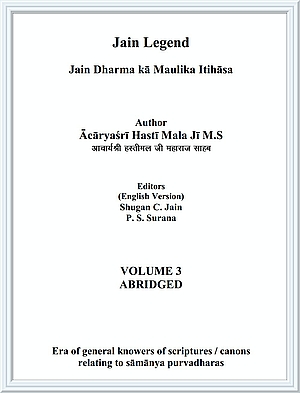A great commentator (ṭīkākāra) and text writer of Senagaṇa Paṃcastūpānvayī congregation in Vikram 9th century by the name Vīra Sena existed. He earned immortality and great name by composing great and holy texts Dhavalā and Jayadhavalā and thus served the cause of Jainism and enhanced the prestige of Jain literature in a grand and effective manner. Ācāryas and respected scholars of gaṇas and gacchas, other than Paṃcastūpānvayīs have also showered their choicest praise for his extreme in-depth knowledge of doctrine and poetry. Ācārya Jina Sena of Punnāṭa congregation in his text 'Harivaṃśapurāṇa' has decorated him with the title of Sārvabhauma Samrāṭa cakravartī or the emperor of the world.
Senagaṇa is a very old gaṇa which was established by the monks coming from Paṃcastūpa named their gaṇa after a monk Sena amongst them. Therefore its other name as Paṃcastūpānvaya became very popular also.
Vīra Sena composed an extremely large text 'Dhavalā' based on the commentary 'Vyākhyā Prajṅapti' on Ṣaṭkhaṇḍāgama by Bappagurudeva. According to a citation in Dhavalāā, after the rule of Jagatuṃgadeva (probably during the rule of Amoghavarṣa-I) completed the composition of Dhavalā in Vāṭagrāma on Kārtika Śukla 13th Vikram 738. Vīra Sena has used the style of cūrṇis in composing this text in mixed Saṃskṛta and Prākṛata languages. Dhavalā is a very voluminous text with 72000 verses. Three quarters of Dhavalā is written in Prākṛata and the remaining one fourth is used in Saṃskṛta. Prākṛata used is mostly Śaurasenī. It is divided into six sections.
In Dhavalā, Vīra Sena had written that sermons of Śvetāmbara Ācārya Nāgahasti are as 'pavāijjaṃta' i.e. as per the pure Jain tradition while the sermons of another Śvetāmbara Ācārya Ārya Maṃgu (Maṃkṣu) are not so i.e. 'apavāijjaṃta' i.e. not worth any mention in Jain literature. Such statements by Ācārya Vīra Sena also indicate prevalence of some differences in interpretation of Jain doctrine between guru-disciple duo of Ārya Nāgahasti and Maṃkṣu.
Ācārya Vīra Sena had written this commentary on the first five parts of Ṣaṭkhaṃḍāgama. The sixth part of Ṣaṭkhaṃḍ āgamahad been named as Mahābandha and its ṭīkāhad therefore been named as Mahādhavalā. The sixth part of Ṣaṭkhaṃḍ āgamawas written by Ācārya Bhutabali. The size of Mahābandha, ṭīkā on the sixth part of Ṣaṭkhaṃḍ āgama, is 30000 verses.
After composing 72000 verses grand ṭīkā named Dhavalā on Ṣaṭkhaṃḍ āgama, Ācārya Vīra Sena then started composing ṭīkā called Jayadhavalā on Kaṣāya Pāhuḍa by Ācārya Vīra Sena. He had only composed 20000 verses of this ṭīkā when he died. This was completed by his disciple Ācārya Jina Sena in Śaka 759 (Vikram 894).
It is a sheer coincidence that the three successive ācāryas of Senagaṇa were all scholar monks and writers of holy texts. They used to complete the incomplete works of their teachers. Ācārya Vīra Sena had just composed 20000 verses of Mahābandha when he died and then his disciple Ācārya Jina Sena added another 40000 verses to this incomplete work and completed the text. Similarly Ācārya Jina Sena had written only 42 sub section completely and three verses of the 43rd section out of 47 sections (with 12000 verses) of Ādi Purāṇa and died. The remaining sections were then completed by his disciple Ācārya Guṇa Bhadra who started writing the remaining four sections and 1620 verses as Uttarapurāṇa after Mahāpurāṇa written by Ācārya Jina Sena. In this way Guṇa Bhadra also completed the incomplete work his guru Ācārya Jina Sena.
Similarly it appears that Guṇa Bhadra could not complete Uttarapurāṇa and his work was completed by his disciple Lokasena.
Bhaṭṭāraka Jina Sena (Paṃcastūpānvayī Digambara tradition)
Ācārya Jina Sena of Bhaṭṭāraka tradition, disciple of Dhavalākāra Ācārya Vīra Sena of Paṃcastūpānvaya Sena gaṇa was a glorious author of Jain texts.
Citation in verse 22 of Jayadhavalā says that Jina Sena who did not have his ears pierced in his childhood; got himself accepted as he met the conditions of the gaṇa and initiated in Śramaṇa monkhood under Ācārya Vīra Sena of Paṃcastūpānvayī Sena gaṇa as per their tradition of inducting only those who had not received their ears pierced as childhood ceremony. Ācārya Jina Sena of Punnāṭa congregation completed composition of 'Harivaṃśapurāṇa' in Śaka 705. In beginning of Harivaṃśa itself he showered praises on poets of earlier times and his contemporary Alongwith in verse he showered extraordinary praise on the Paṃcastūpānvayī Jina Sena and his composition Pārsvārbhyudaya in verse 40. To complete the voluminous 'Harivaṃśapurāṇa', the author must have spent 5 to 7 years. It thus takes us to the conclusion that Jina Sena must have completed Pārśvābhyudaya inŚaka 695-700.
Pārśvābhyudaya is such a unique and extraordinary poetic composition that it not only addresses conflicts and their re solutions but also encompasses the entire Meghadūta in it. Poetic description of the feelings of a yakṣa who was remembering his separated yakṣi for fulfilment of his lust is the essence of Meghadūta. As against this the essence of Pārśvābhyudaya is filled with the detachment and giving up worldly pleasures in the life of Lord Pārśvanātha. There is a vast difference like the hell and heaven or like the moon on dark moon night and on the full moon night. In spite of such vast differences, Ācārya Jina Sena has kept his readers and scholars utterly astonished and attached in Pārśvābhyudaya as khaṇḍakāvya.
The literary work done by Ācārya Jina Sena is similar to what had been described in the life sketch of ĀcāryaVīra Sena.
Ācārya Jina Sena after entering youth got himself initiated by Ācārya Vīra Sena. Like his teacher, Ācārya Jina Sena was also a diligent and hardworking scholar. He continued to serve extraordinarily the world of Jain literature by his services for 70 to 75 years. A review of historical facts suggests that he lived for 88-90 years died around Śaka 765. His time is thus estimated as Vikram 810-900 or Śaka 675-765.
 Acharya Hasti Mala
Acharya Hasti Mala
